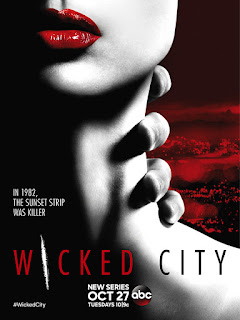Wicked City (Tuesdays at 10:00 on ABC)
The latest in a long line of serialized cop shows is more jarring than most that have come before it, but not for the reason you'd expect. ABC's Wicked City isn't gorier or grittier or gloomier than its predecessors. It's not more graphic or more gruesome. Wicked City is jarring because it's relatively tame in comparison to the shows it tries to emulate, like True Detective, Bosch, The Killing, and The Bridge, sometimes to its own detriment.
This is the Sunset Strip in 1982, and Detective Jack Roth (Jeremy Sisto, channeling his earlier work on the final three seasons of Law & Order) is on the trail of a serial killer (Gossip Girl's Ed Westwick) who's copying the infamous Hillside Strangler murders. Kent taunts his prey, seducing them and then stabbing them while they perform fellatio on him, songs he's dedicated to them playing on the radio. As gross as that scene sounds, it's not actually the most shocking thing in Wicked City's pilot. After becoming accustomed to police shows which rely heavily on cell phone records, GPS locations, and internet history files, the most jarring part of the show is the lack of technology. Wicked City will be relying on good old police work, the kind that involves shady relationships with coke dealers in strip clubs and beating up paparazzi who break into a crime scene.
It's a refreshing change of pace for a police series. Wicked City isn't interested in being a copycat of the grey-tinted, perpetually depressing detective shows that are all over the place. This isn't grief porn or torture porn. It's not shakily shot or edited with grit. The music isn't brooding and haunting (it's actually full of Billy Idol and Joan Jett songs). The cinematography is smooth, clear, and crisp. It's dark but full of reds and neons, not blues and grays. Director Tom Shankland veers away from the type of direction he lent to The Missing last year and embraces the time period, helming the pilot with a sure but light hand that's void of fancy angles or quick cuts or extreme close-ups, mimicking the style of television and films of the period. It's a simple style that's reflected in the show's plot and investigation. There are no hackers, no internet lurkers, no panic when a cell phone loses reception, but that doesn't mean there's no tension. Shankland does wonders with a scene in which Roth impatiently waits for a rotary phone to dial his precinct, all the while trying to keep an eye on a journalist (American Horror Story's Taissa Farmiga) who's in danger.
Unfortunately for Shankland, he's working with a lackluster script from first-time creator Steven Baigelman (he has no other television writing credits and only four film scripts under his belt since 1996). Baigelman's dialogue is unremarkable, and his characters are almost universally flat. Jack Roth is a dime-a-dozen leading man: he's married but having an affair with a stripper, and his biggest defining trait is that his last partner committed suicide. He's uninteresting, and he's saddled with the worst of the pilot's dialogue ("I don't think he knows the killer... I think he is the killer."). Farmiga's barely-legal reporter Karen McClaren (Is that not the stupidest name you've heard for a character in a long time?) is similarly bland, as is Jack's new partner, whose name I didn't even catch since he's pretty much a non-entity so far. The only characters who have any hope of emerging with some interest are Kent and Betty, a nurse and single mother who Kent nearly kills but later seduces into being his sort-of sidekick. Kent has some obvious psychological issues, what with the murdering and necrophilia and all, and watching Westwick play up the unsettling charm of the character is fun. And Betty has a darkness to her that's only just starting to be explored, from mashing a spider in her hand after telling her kids to "do no harm," to ripping out a patient's stitches with gusto.
The story the characters get to play out could be fun if Baigelman lets it be. The final scene at the Whisky a Go-Go is intense, and the potential of following a pair of serial killers as they descend into madness intrigues me. But the setup for future episodes makes Wicked City out to be a standard cat-and-mouse type show with the two killers playing a kind-of 1980s Bonnie & Clyde, which would be more in line with Baigelman's pedestrian storytelling up until that point. Still, Westwick and Christensen are wickedly (sorry, I had to get it in once) entertaining, and the time period works surprisingly well to create a fresh approach to the cop drama. If you don't go in expecting something earth-shattering, Wicked City can actually be perfectly fine diversion. Besides, it's not like there's anything all that great on Tuesdays at 10:00 anyway. That may seem like supremely faint praise, and it is. It's not saying much, but you could do worse... and Wicked City could do better.

Comments
Post a Comment